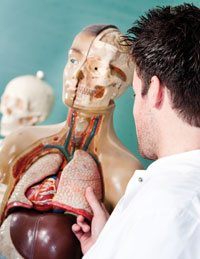How to work in... academic medicine
Post date: 04/08/2012 | Time to read article: 5 minsThe information within this article was correct at the time of publishing. Last updated 14/10/2021
A career in academic medicine opens up a chance to work at the frontier of medical science, writes Dr

In the likes of Holby City and Scrubs you are unlikely to see someone from the world of academic medicine rushing to save the day. However, at the real cutting edge of medicine you’ll find medical academics. They may not feature in many medical soap operas, but underpinning all medical specialties is a creative, scientific force pushing scientific boundaries.
Medical academics are an incredibly diverse group of individuals, and this is reflected in the diversity of their work. The unique perspective of the clinician-scientist can prompt some of the best research, inspired by clinical problems and an understanding of the patients’ and clinicians’ viewpoint.
At the heart of academic medicine is communication. If you can’t communicate your findings, discuss your proposed studies or work with a varied group of colleagues, you’ll never succeed in research. This is far from the negative stereotype of the ‘mad boffin’ unable to talk to normal people. It is a highly creative form of medicine and allows an enormous sense of freedom to direct your career. You can take a problem that excites your curiosity, design a study and (after much hard work) try and solve it.
Academic medicine allows you to become a true expert in your field and allows a freedom to choose the direction of your career in a way that is rare in clinical medicine.
"Academic medicine allows you to become a true expert in your field and allows a freedom to choose the direction of your career"
How to train in academic medicine
The Walport report was published in 2005 and it was aimed at addressing the problem of recruitment into academic medicine. It identified a lack of a clear career structure as a barrier to young doctors being able to establish themselves in academic medicine. This led to the development of an integrated career structure that combined academic and clinical training.
There are three main entry points into academic medicine.
- The academic foundation programme allows foundation doctors to spend four months in an academic placement, allowing them to get a grounding in research methodology.
- Academic Clinical Fellowships (ACFs) are generally taken up by core trainees in ST1-3, although you can take up such posts at any point in training. ACFs are available in all medical specialties; 25% of the time is spent in academic work. ACFs must also achieve the same clinical competencies as their purely clinical colleagues but they are also expected to meet academic competencies. Ultimately, it is expected that ACFs will formulate a study and use their time to achieve pilot data that will allow them to take time out of programme to achieve a PhD. ACF programmes are run through posts and run for a maximum of three years. If an ACF wishes to, or fails to progress, then the post can revert to a standard clinical post.
- For higher trainees who already have a PhD or an MD, Academic Clinical Lectureships (ACLs) are the next step on the academic career ladder. Like ACFs, lectureship posts are integrated with clinical training, but 50% of the time is spent as an academic. It is expected that ACLs will build on their doctoral research and develop a body of work to apply for funding for a clinician scientist award.
The clinical scientist is the ultimate aim of the integrated academic pathway. This combines NHS consultant work with leading your own research group.
What do academics do?
Academics work in all fields of medicine, from gastroenterologists working on the basic science of immunology to psychiatrists studying patients with functional MRI to oncologists carrying out qualitative work. What all this work has in common is the process of approaching problems scientifically. It begins with an understanding and a critical approach to existing literature. Discussion with colleagues is key in formulating research questions and designing studies to answer them. In academic medicine you work with a whole team of different people and draw on their skills. As you progress through your career, the contacts you make can shape your work.
"Communicating the findings of your research is the most important role of an academic"
What does it take?
Above all else academic medicine takes a passion for your chosen subject. Without passion, you will find it very hard to keep motivated. Creative flair to generate ideas and questions is essential. Above all else, it takes dedication and a drive to see an idea through over a period of years.
Experience of research earned through intercalated degrees or whilst working is desirable, and it is expected that someone applying for an academic job at any level will have taken every opportunity open to them to gain experience of research, develop research skills and publish in journals.
What are the best bits?
- The sense of achievement when your research delivers results.
- Recognition for all your hard work when your paper gets published.
- A greater freedom to take your career where you want.
- The opportunity not only to ask questions about medical science, but attempt to solve them.
What are the worst bits?
- Having two demanding mistresses: the NHS and academia.
- If you take time out of programme, you can feel ‘behind’ your colleagues who graduated with you.
- Research work is like running a marathon and it can sometimes feel like a bit of a slog. The feeling of a mountain of work to do with a deadline looming for your thesis submission, a conference abstract or a grant application is definitely the worst bit.
How to find out more
- The NIHR website outlines all the details of the integrated medical careers
- The Academy of Medical Science has promoted careers in academic medicine and has an excellent mentorship programme
- Each deanery and specialty has an overall academic lead. Information on who the leads are can be found on individual deaneries’ websites.
- The BMA Medical Academic Sub-Committee have produced a Medical Academics Handbook providing information on employment issues and more.
Dr Cathy Symonds is an ST3 in psychiatry and an NIHR BRC Clinical Fellow based in the Northwest of England.
Why I love academic medicine
 By Dr Kyle Stewart
By Dr Kyle Stewart
The word “ academic” often makes people think of old men in tweed jackets pondering over the latest medical papers. In reality academic medicine is an exciting new avenue for doctors.
Academic posts for foundation doctors have recently started to emerge across the country, offering positions in research (ranging from ward based research to laboratory work), where you can work with global specialists and become an expert in a particular field.
An academic post should be considered by those trainees who have already established themselves ahead of their peers in research, teaching or writing. These posts often allow the trainee a lot of unsupervised and nonclinical time to pursue their own projects. Often, the candidates who are accepted are performing above average clinically, as they eat into clinical attachments.
There are also posts in medical education. I’m currently an academic F2 in medical education at Torbay Hospital in South Devon. I run teaching and training sessions for all members of the multi-disciplinary team. This involves all types of teaching including, my favourite, scenario-based simulation training using manikins in real-life environments. Recently we ran a full trauma call in our emergency department using the manikin. The simulation ran right until the manikin went through the CT scanner. The training was filmed and we have now identified learning needs both during the initial assessment and the stabilisation of the trauma patient.
Academic posts are a great way to stand out from the crowd at interviews and get some impressive work under your belt. So get preparing and get applying!!
Dr Kyle Stewart is an academic F2 doctor in gastroenterology at Torbay Hospital in Devon.
